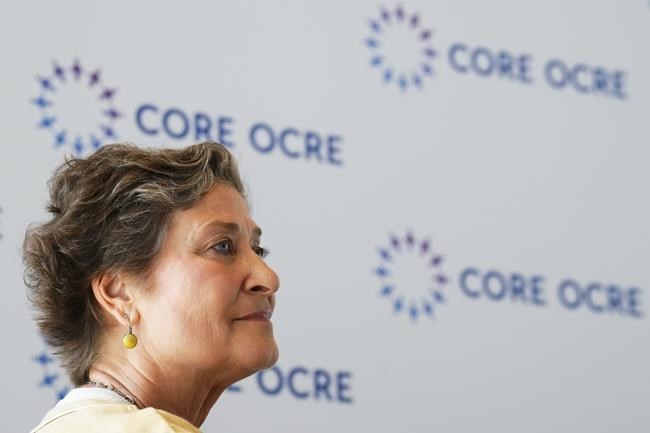OTTAWA — Canada's corporate-ethics watchdog is investigating if Walmart, Hugo Boss and Diesel have forced labour in their supply chains.
Sheri Meyerhoffer, the Ombudsperson for Responsible Enterprise, issued three reports today saying none of the companies have done enough to demonstrate the products they sell in Canada are free of slave labour.
The Canadian subsidiaries of all three companies are accused of relying on suppliers who source materials from Uyghur people forced to work in China’s Xinjiang region.
Walmart Canada Corp.,Hugo Boss Canada Inc.and Diesel Canada Inc.all say they uphold strong anti-slavery protocols and investigate the source of their products, but Meyerhoffer said none provided enough information about specific allegations.
She said the main challenge is that products from Xinjiang are often processed in other countries, meaning that imports from countries like Vietnam could involve forced Chinese labour if they’re not carefully traced.
Meyehoffer said she's probing Walmart Canada because the company would only say that it avoids forced labour and had removed products made in Xinjiang from its stores. The company did not respond to documented allegations that Walmart is relying on specific clothing and textile firms that operate in that region using forced Uyghur labour.
"While Walmart Canada generally denied the allegations in the complaint, it did not provide a specific response," Meyerhoffer wrote, noting that Walmart opted against a dispute-resolution process.
Meyerhoffer noted that Hugo Boss doesn't seem to use the level of fibre-tracing technology needed to ensure due diligence in a region widely exposed to cotton from Xinjiang.
In its response, the company noted it scrutinizes its "direct suppliers," which concerned Meyerhoffer since its goods from Vietnam or Singapore could rely on various Chinese materials. "Hugo Boss' response does not appear to consider fully the complex nature of the garment supply chain," she wrote.
Hugo Boss also noted a European rights group failed to gather enough evidence to convince German courts to hear allegations the firm had illegally benefited from Uyghur forced labour.
Meanwhile, Meyerhoffer took Diesel to task over what she deemed to be vague statements about its internal reviews of its supply chains, which she said didn’t indicate the timeline, scope or findings of such a review.
She noted the company’s insistence that it doesn’t source cotton from the Xinjiang region isn’t sufficient to ensure suppliers in other countries aren’t using such fibres.
"Diesel Canada provided two brief responses to the complaint, did not provide any response to multiple requests for an initial assessment meeting and did not provide any comments on the draft initial assessment report," reads Meyerhoffer’s report.
"Diesel Canada’s failures to respond … and to engage with the CORE for an initial assessment meeting raise questions about its transparency."
Meyerhoffer said all three companies did not comply in her investigations.
She wrote that Walmart Canada questioned her jurisdiction, and provided general information that didn’t speak to the specific allegations. “The company representatives also questioned what Walmart Canada would have to gain from participating in the process,” Meyerhoffer wrote.
Hugo Boss took issue with an April 2022 media report that named the firm among 14 companies in a complaint alleging the use of forced labour in China. The company claimed that the media report violated the ombudsperson’s rules on confidentiality, and requested the complainants and Meyerhoffer sign a non-disclosure agreement.
The company also took issue with Canada’s freedom-of-information laws, which allow Canadians to learn about the workings of their government but generally exempt confidential corporate information. Hugo Boss “did not respond to multiple requests to meet,” Meyerhoffer wrote.
Her office says Hugo Boss was the only firm she's investigated so far that raised issues with the April 2022 media report, and she said the company refused offers to meet until Meyerhoffer had drafted a report.
The Canadian Press has reached out to all three firms for comment.
A spokeswoman for Walmart Canada noted that none of the subsidiaries named in the complaint "are in our active disclosed supply chain."
"Our policies are diligently enforced," wrote Sarah Kennedy. "Walmart Canada respects CORE’s mandate and will continue to ensure our standards and corporate mandate are being upheld."
Hugo Boss reiterated much of its response to Meyerhoffer, with spokesman Matthias Jekosch noting the company no longer buys from the Chinese supplier cited in the complaint.
"Hugo Boss does not source any goods in its direct supply relationship that originate from the Xinjiang region," he wrote. "As a matter of principle, we do not tolerate forced or compulsory labour or any form of modern slavery."
All seven of the initial assessments the ombudsperson has announced so far relate to accusations of forced labour involving the Uyghur people.
The Chinese embassy in Ottawa maintains that Beijing does not allow modern-day slavery, and that claims otherwise are based on lines meant to constrain China's development.
The United Nations found in mid-2022 that China had committed "serious human rights violations" against Uyghurs and other Muslim communities that "may constitute international crimes, in particular crimes against humanity." Beijing has disputed this report.
This report by The Canadian Press was first published Aug. 24, 2023.
Dylan Robertson, The Canadian Press




